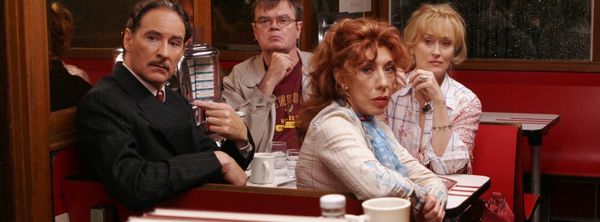Eye For Film >> Movies >> A Prairie Home Companion (2006) Film Review
A Prairie Home Companion
Reviewed by: Scott Macdonald

"We are the music-makers, and we are the dreamers of the dreams..." - Roald Dahl
Sorry for stealing a quote, but it ran through my head throughout Robert Altman's final picture. It is a delightful, genial, lovable movie - the product of an idiosyncratic artist and master storyteller. It's a film about the treasurability of memory - never forgetting the past, but also never living in it. An ironic mixture, given the movie tells the story of a corny and quaint radio show, deep in Sixties nostalgia. It is famous in the Mississippi, but unknown here. Given that I had to do a Google search to discover its origins, it's a credit to Altman that I rarely questioned the movie's homespun authenticity. After all, the radio show has been playing "since Jesus was in the 3rd grade."

A Prairie Home Companion depicts the final performance of the live radio show of the same name. It stars Garrison Keillor (playing himself) as master of ceremonies, equally at home presenting the show and spinning off long soothing soliloquies at firecracker tangents. The rest of the cast associate in their dressing rooms. We're introduced to the folksinging Johnson sisters (Meryl Streep and Lily Tomlin), and daughter in tow, Lola (a wonderfully understated Lindsay Lohan), who writes suicide-laden poetry and music. Woody Harrelson and John C Reilly as Dusty and Lefty spin yarns and bounce folksy bad jokes back and forth.
Modern actors mingle freely with the cast and crew of the show - even the soundman gets his own short moment in the spotlight. The film is shot in elegant high-definition video, borrowing invisible Steadicam long-take cinematographic technique from Altman's previous ensemble movies. It also shares the narrative structure of dovetailed behind the scenes and performance storytelling, as he used in his brilliant The Player (1992) - satirising the movie industry with laser accuracy - and in The Company (2004) - comprising ballet performances.
Gumshoe detective Guy Noir (Kevin Kline) brings us in and out of the story, handling security for the show's production. His character feels like it's walked in from another movie, perhaps A Fish Called Wanda without the psychosis. He demonstrates a wonderful flair for light physical comedy and voice-over. His borderline perverted, velvety physical description of Virginia Madsen's angel - credited as "Dangerous Woman" - had me guffawing loudly.
Dealing with death and change is a theme which runs through A Prairie Home Companion. Whether or not to announce the final broadcast is hotly debated. "Every show is your last show. That's my philosophy," Keillor states backstage. "Thank you, Plato," they fire back. A death occurs - the Dangerous Woman soothes the pain of the bereaved like the angels in Wings of Desire. Keillor stamps his authority by not announcing it on the air.
"Don't you want people to remember you?" Lola challenges. "I don't want them to be TOLD to remember me."
Tommy Lee Jones' Axeman represents inevitable and immutable change, coming in the shape of a new parking structure over the old theatre. They plead with him and pray to the angel to set things right. Does the angry, vengeful God set things right?
There's so much to like about the film: the dry simplicity of the characters, the jovial banter, the invisible and yet bounteous characterisation, the honest and straight-up humour, the music - Meryl Streep is a fantastic singer! - and enjoying memories for their face value. It's a comfortable picture, reminiscent of My Dinner With Andre, the audience feels it's privy to a rich phatic conversation between friends. Deceptive and open, as deep and simple as movies should be.
Robert Altman, you will be missed. And I won't remember you because I'm told to! I'll do it through your contribution to the movies.
Reviewed on: 24 Dec 2006


















